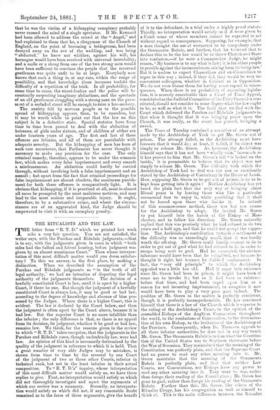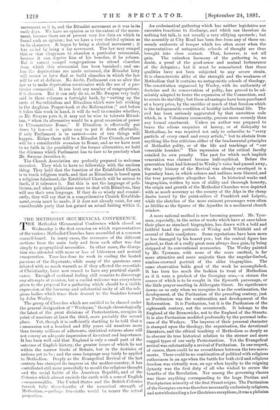THE RITUALISTS AND THE LAW.
THE letter from "R. T. D." which we printed last week asks a very fair question. You are not satisfied, the writer says, with the Purchas and Ridsdale judgments,—that is to say, with the judgments given in cases in which "both sides had the fullest and fairest hearing, before judgment was given by an almost unanimous Court." Then whose interpre- tation of this most difficult matter would you deem satisfac- tory? To this we answer, in the first place, by making a distinction. When we described the assumption of the Purchas and Ridsdale judgments as "in the teeth of all legal authority," we had no intention of disputing the legal authority of the judgments themselves. The decision of a lawfully constituted Court is law, until it is upset by a higher Court, if there be one. But though the judgment of a lawfully constituted Court is always law, it may be good or bad law, according to the degree of knowledge and absence of bias pos- sessed by the Judges. Where there is a higher Court, this is evident. The law is declared by the Court below, and then the judgment is often upset by the Court above, because it is bad law. But the superior Court is no more infallible than the inferior ; the only difference is that, as there is no appeal from its decision, its judgment, whether it be good or bad law, remains law. We think, for the reasons given in the review to which "B. T. D." takes exception, that the judgments in the Purchas and Ridsdale cases, though undoubtedly law, were bad law. An opinion of this kind is necessarily determined by the quality of the judgment in reference to which it is held. That a great number of very able Judges may be mistaken, is shown from time to time by the reversal by one Court of the judgment of two or three other Courts, inferior in technical rank, but not in the least inferior in their actual composition. To "R. T. D.'s" inquiry, whose interpretation of this most difficult matter would satisfy us, we have three replies to give. First, no interpretation would satisfy us which did not thoroughly investigate and upset the arguments of which our review was a summary. Secondly, no interpreta- tion would satisfy us which did not, if any reasonable doubt' remained as to the force of these arguments, give the benefit of it to the defendant, in a trial under a highly penal statute. Thirdly, no interpretation would satisfy us if it were given by a Comt some of whose members cannot be expected to act without regard to consequences. Supposing, for example, that a man thought the use of vestments to be compulsory under the Ornaments Rubric, and further, that he believed that to declare this to be the law would be to throw Church and State into confusion,—if he were a Common-law Judge, he might reason, My business is to say what is law; it is for other people to provide against the inconveniences arising from its being law.' But it is useless to expect Chancellors and ex-Chancellors to argue in this way ; indeed, if they did, they would be very in- convenient colleagues, whether in Cabinet or in Opposition. We do not even blame them for having some regard to conse- quences. When there is no probability of amending legisla- tion, it is scarcely conceivable that a Court of Final Appeal, constituted as the Judicial Committee of the Privy Council is con- stituted, should not consider in some degree what the law ought to be, as well as what it is. The fault that we find with the Court which delivered the Purchas and Ridsdale judgments is, that when it thought that it was bringing peace upon the Church, it was really, as the event has proved, bringing a sword.
The Times of Tuesday contained a narrative of an attempt made by the Archbishop of York to get Mr. Green out of prison. The attempt failed, as the Archbishop most have foreseen that it would do ; at least, it failed, if its object was simply to release Mr. Green. As, however, the Archbishop himself says that it has not been "wholly vain," inasmuch as it has proved to him that Mr. Green's cell "is locked on the inside," it is permissible to believe that its object was not simply to release Mr. Green. The difficulty with which the Archbishop of York had to deal was the one so excellently stated by the Archbishop of Canterbury in the House of Lords. How, supposing Mr. Green to be got out of prison, is he to be kept from getting into it again ? Neither Archbishop has yet faced the plain fact that the only way of bringing about Ritual peace is by leaving those who like a particular ceremonial free to enjoy it., while providing that it shall not be forced upon those who dislike it. In default of this common-sense method, there was but one course for the Archbishop to adopt. lie invited Mr. Green to put himself into the hands of the Bishop of Man- chester, and to follow his direction. Mr. Green naturally replied that this was precisely what he had refused to do two years and a half ago, and that he could not accept the sugges- tion. The Archbishop's contribution towards a settlement of the difficulty was so exceedingly small, that it was hardly worth the offering. Mr. Green could hardly consent to do in order to get out of gaol what he had refused to do in order to escape being sent to gaol. Had he consented, the obvious inference would have been that he submitted, not because he - thought it right., but because he disliked confinement. In fact, the "very old principle" to which the Archbishop appoaled was a little too old. Had it come into existence since Mr. Green had been in prison, it might have been of some use to invoke it ; but as it had been in existence before that time, and had been urge,1 upon him as a reason for not incurring imprisonment, to recognise it now would have been to play a very poor part indeed. The position of Mr. Green in the matter is perfectly consistent, though it is perfectly incomprehensible. He has convinced himself that there is a law of the Church which is superior to the ruling of the Archbishop's Court, to the opinion of the assembled Bishops of the Anglican Communion throughout the world, to the resolutions of Convocation, to the determina- tion of his own Bishop, to the invitation of the Archbishop of the Province. Consequently, when D. Thomson appeals to all these inferior authorities, he does not in any way touch Mr. Green. The Ornaments Rubric is to him what the Constitu- tion of the United States was to Southern statesmen before the War of Secession. They maintained that the meaning of the Constitution was perfectly plain, and that the Supreme Court had no power to read any other meaning into it. Mr. Green maintains that the meaning of the Ornaments Rubric is perfectly plain, and that that neither Law Courts, nor Convocations, nor Bishops have any power to read any other meaning into it. They went to war, rather than forego their reading of the Constitution ; Mr. Green has gone to gaol, rather than forego his reading of the Ornaments Rubric. Further than this, Mr. Green, like others of the Ritualist Clergy, has his congregation as well as himself to think of. This is the main difference between the Ritualist
movement as it is, and the Ritualist movement as it was in its early days. We have no opinion as to the extent of the move- ment, because there are at present very few data on which to found such an opinion ; but we have a very decided opinion as to its character. It began by being a clerical movement ; it has ended by being a lay movement. The law may compel this or that clergyman to abandon a particular ceremonial, because it can deprive him of his benefice, if he refuses. But it cannot compel congregations to attend churches from which this ceremonial has been banished ; and un- less the deprivations are made universal, the Ritualist laity will sooner or later find or build churches in which the law will be set at defiance. No doubt, Parliament can so alter the law as to make deprivation coextensive with the use of a par- ticular ceremonial. It can beat any number of congregations, if it chooses. But it can only do so, as Mr. Swayne very truly said in these columns a fortnight back, by "cutting up the roots of Sacerdotalism and Ritualism which were left sticking in the Anglican Prayer-book at the Reformation ;" and before it takes this work in hand, it will do well to consider whether, as Mr. Swayne puts it, it may not be wise to tolerate Ritual- ism, 'when its alternative would be a great accession of power to Ultramontane Rome." If Ritualism is effectually put down by law—it is quite easy to put it down effectually, if only Parliament is in earnest—one of two things will happen. Either there will be a Ritualist Free Church, or there will be a considerable secession to Rome, and as we have next to no faith in the possibility of the former alternative, we hold the dilemma which Parliament has to face to be precisely what Mr. Swayne describes it.
The Church Association are perfectly prepared to welcome secession. They wish to have no fellowship with the unclean thing. They hold that the function of the Established Church is to teach religious truth, and that as Ritualism is based upon a religious falsehood, the Established Church will be untrue to itself, if it tolerates it. But this is not the language of poli- ticians, and when politicians come to deal with Ritualism, they will use their own language. If they do so wisely and consist- ently, they will say that in a comprehensive Church Establish- ment, room must be made, if it does not already exist, for any considerable party that has gained an actual footing within it.































 Previous page
Previous page